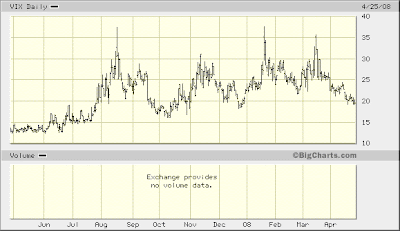To recap Part 1, financial regulation failed miserably to recognize or prevent the current credit crisis and actually played an integral role in creating and fostering the credit bubble. Most politicians, regulators, and pundits are using this failure as an excuse to expand that which just failed - regulation. Unfortunately, our policymakers are far too busy trying to look “responsible” and “proactive” to actually expend any effort examining the role the regulators themselves played in creating the current debacle or questioning whether less regulation may actually be the better policy. I’m accustomed to being on the unpopular side of many arguments, and this one is no different.
I’ve been reading quite a bit lately from all corners that the current credit crisis is proof of the failure of free market economics. This is laughable since we’ve hardly been operating in a free market system. When it comes to the financial markets, we have many organizations involved in the regulation and manipulation of our markets, our financial institutions, our money supply, our interest rates, etc. Despite all of this, we are facing the largest financial crisis since the Great Depression. It’s important to understand that regulation has been prevalent and growing for many decades. Yet, here we are.
Then how may things have transpired in a truly free market? Most importantly, moral hazard would not be an issue if the free market had been in operation. Basically, moral hazard means that people will be less cautious if they know they’ll be bailed out. Bailing out is exactly what the Fed under Greenspan did repeatedly, and it’s exactly what the Fed under Bernanke is doing currently. It’s also what the federal government does when it passes legislation to bail out certain constituents. Financial actors aren’t stupid. Greedy? Yes. Stupid? No. They’ve realized for some time now that the Fed and government were effectively putting a floor under the financial markets (LTCM, Asian currency crisis, tech bubble). The Fed repeatedly demonstrated that it was willing to aggressively intervene during relatively modest financial dislocations. In such a world, the obvious course of action is to lever up as much as possible and swing for the fences. Heads you win, tails you don’t lose.
In a free market, the issue of moral hazard disappears because no one gets bailed out. There is no Federal Reserve, or Treasury or Congress standing ready to lower rates, print money, and use taxpayer dollars to “rescue” the imprudent. The losers fail. They go away. Long-Term Capital Management would not have been bailed out. The Fed would not have guaranteed $30 billion of questionable Bear Stearns assets. The strong prosper. The weak fail. A strong signal is sent to all market participants that there is a significant and definable downside to taking too much risk. This signaling has unfortunately been overridden by the regulators/politicians in our increasingly quasi-capitalistic system of democratic socialism.
It’s important to recognize that government and regulatory intervention in our markets has led to ever larger bubbles, misallocations of capital, and financial dislocations. Without the Fed manipulating interest rates and the money supply, ever-larger serial bubbles would not have been blown, the money supply would not have been so grossly inflated, inflation would be less of a threat (by definition), and the dollar wouldn’t be nearly so weak. We can recognize all of this, but we can’t go back and undo what’s already occurred. Given that fact and given the crisis we’re currently in, what might we expect from a free market from this point forward if regulation were magically eliminated today? The following are just a few reasonable realistic possibilities:
- Development of better risk models and more focus on risk management
- More aversion to and higher risk premia for complicated security structures
- Increased competition in the credit-rating market resulting ultimately in better analysis and modeling
- Insolvent financial institutions would be allowed to fail
- Increased financial statement disclosure
- More accountability for evaluating risk at all levels of distribution
- Credit-rating agencies being compensated by investors rather than by the companies they rate
- A strong call for financial institutions to increase their capital position
- A continuing trend of deleveraging
- Mortgage originators retaining more security exposure to better ensure adequate underwriting standards
- Opportunists taking advantage of illiquid markets to buy securities at deep discounts to their intrinsic value
- Unwinding of and more sensitivity to counterparty arrangements
- Development of more standardized derivative contracts and clearing arrangements
- A better and more symmetrical alignment of executive compensation with longer-term shareholder goals
- More critical analysis of credit insurer strength
- Clearer and more robust mortgage terms disclosure
- Fewer no-doc or low-doc mortgages and/or higher spreads on them
- Less opaque securitizations
All of these things would be healthy for the market and would lead to a strengthening of our financial system. Some variation of many of these suggestions as well as others can be expected to occur over the next 5 years without any government intervention simply due to the demands of various financial market constituents. None of this requires government intervention.
Now let’s look at just a few examples of free market success so far in this current crisis. First is the entry of Warren Buffett into the municipal bond insurance business. This is exactly what we’d expect to see - a strong player with extensive capital and an excellent reputation entering a failed industry that didn’t adequately price its insurance or assess its risk. Other individuals and firms are also exploring entering this market. Should we use taxpayer dollars to support the incumbents (for example, MBIA, SCA, and ABK) to the detriment of the newer and stronger players? No. The free market is filling the void and will be doing so with better risk modeling and a stronger capital position.
When asset prices finally start to adequately price in risk, liquidity tends to surface. For example, on April 1 Blackstone Group LP raised a record $10.9 billion to invest in property. It was also recently reported that another opportunity fund, Dallas-based Lone Star Funds, is raising up to $10 billion to invest in real estate. Lone Star managing partner John Grayken recently told the Oregon Investment Council, ``This is as good a distressed environment as we've seen in a long time. It's a race among a number of different lenders to play this.'' This week, we also learned that Citigroup is close to unloading $12 billion of bad loans to a group of private-equity firms at 90 cents on the dollar.
There are many other examples of capital being raised. UBS recently raised another $15 billion. Lehman raised $4 billion. Washington Mutual is raising $7 billion. Sovereign Wealth Funds (SWFs) have tossed about another $70 billion into investment banks over the past year. The point is that when prices fall enough to adequately (or more than adequately) discount the risk, private funding is made available. Capitalism does work (when allowed). The quicker this process unfolds the better for the financial system and the economy. The bailout efforts by the Fed and the government are simply dragging out this price-discovery process and delaying the eventual economic recovery. Of course, others could argue that this money is only forthcoming now because of the steps that the Fed has already taken. My contention, however, is that Fed actions have been hindering and delaying the price-discovery process, keeping asset prices higher than warranted, and therefore keeping further private funding from entering the market and prolonging the correction. Granted, it's impossible to know which view is correct since we can't rewind and play it twice.
We don’t need the government to “bail out” the market, but we’re going to get it, so let’s be clear about what a government bailout means. It means the government is stealing. They’re stealing from those who were prudent – those who bought a house and selected a mortgage that they could afford, those who have been living beneath or within their means, and those who decided to save versus play. The government is using these stolen funds to support/bailout/rescue/benefit/enrich those who speculated on rising home prices, those who gambled on always being able to refinance at low rates, those who took on too much debt, those who have lived beyond their means, and the millionaires running our financial institutions. If you’re in the former group, you should be irate. The government won’t be sending you a bill directly, but they will be increasing their borrowing and increasing the money supply during this bailout. You will suffer the depreciation of your dollar assets and higher inflation as a result.
What would I like to see the Fed/government do? Put their hands back in their own pockets, get out of the way, and sit down with a nice big cup of coffee and a copy of the Constitution (to be read – not to be used as a coaster). Let the market do its job - liquidate the bad debt and the imbalances that have occurred and eliminate the ubiquity of moral hazard. It’s healthy, and it’s in the long-term best interests of our country.
If only the government could bail out common sense.








 Surging foreign trade, fueled largely by the weaker dollar, is filling up ships faster than at any time in recent memory and created a backlog for companies like Reed’s, a Los Angeles-based maker of premium soft drinks, including cream soda and a spicy line of ginger beers.
Surging foreign trade, fueled largely by the weaker dollar, is filling up ships faster than at any time in recent memory and created a backlog for companies like Reed’s, a Los Angeles-based maker of premium soft drinks, including cream soda and a spicy line of ginger beers.







